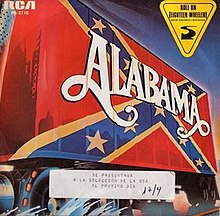
Alabama is an American country music band formed in Fort Payne, Alabama, in 1969. The band was founded by Randy Owen and his cousin Teddy Gentry. They were soon joined by another cousin, Jeff Cook. First operating under the name Wildcountry, the group toured the Southeast bar circuit in the early 1970s, and began writing original songs. They changed their name to Alabama in 1977 and following the chart success of two singles, were approached by RCA Records for a recording deal.

Princetta Kay Adams is an American country music singer.
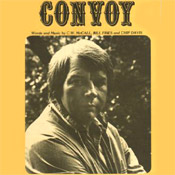
"Convoy" is a 1975 novelty song performed by C. W. McCall that became a number-one song on both the country and pop charts in the US and is listed 98th among Rolling Stone magazine's 100 Greatest Country Songs of All Time. Written by McCall and Chip Davis, the song spent six weeks at number one on the country charts and one week at number one on the pop charts. The song went to number one in Canada as well, hitting the top of the RPM Top Singles Chart on January 24, 1976. "Convoy" also peaked at number two in the UK. The song capitalized on the fad for citizens band (CB) radio. The song was the inspiration for the 1978 Sam Peckinpah film Convoy, for which McCall rerecorded the song to fit the film's storyline.

Only the Greatest is a studio album by American country music artist Waylon Jennings, released in 1968 on RCA Victor. It includes the single "Only Daddy That'll Walk the Line," which Jennings took to #2 on the country music charts that year.

"Wagon Wheel" is a song co-written by Bob Dylan and Ketch Secor of Old Crow Medicine Show. Dylan recorded the chorus in 1973; Secor added verses 25 years later. Old Crow Medicine Show's final version was certified Platinum by the Recording Industry Association of America in April 2013. The song has been covered numerous times, including charting versions by Nathan Carter in 2012 and Darius Rucker in 2013.

"Coat of Many Colors" is a song written and recorded by American country music singer Dolly Parton. It was released in September 1971 as the second single and title track from the album Coat of Many Colors.

Greatest Hits Vol. II is the second compilation album by American country music band Alabama. The album was released by RCA Records in 1991, and has since been certified platinum for sales of 1 million units by the Recording Industry Association of America.
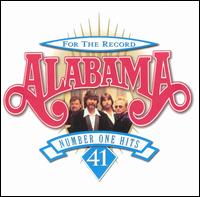
For the Record: 41 Number One Hits is a two-disc, 44-track greatest hits package released by the American country/Southern rock band Alabama.

"Up on Cripple Creek" is the fifth song on the Band's eponymous second album, The Band. It was released as an (edited) single on Capitol 2635 in November 1969 and reached No. 25 on the Billboard Hot 100. "Up on Cripple Creek" was written by Band guitarist Robbie Robertson, with drummer Levon Helm singing lead vocal.

"Tell Her No" is a hit single written by Rod Argent and included by English rock band the Zombies on their debut album The Zombies in 1965. It peaked at No. 6 on the Billboard Hot 100 chart in the United States in March 1965 and was one of three big American hits by the Zombies. "Tell Her No" was only a minor hit for the Zombies in their native Britain, where it peaked at No. 42 on the UK Singles Chart in February 1965.
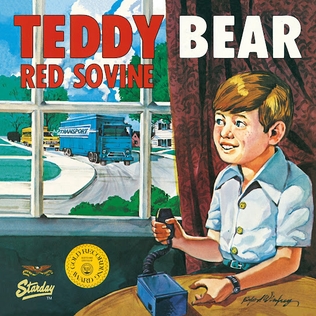
"Teddy Bear" is a song co-written and recorded by American country music singer Red Sovine. It was released in June 1976 as the title track to Sovine's album of the same name.
"The Closer You Get" is a song written by J.P. Pennington and Mark Gray and recorded by American band Exile in 1981. The song was most notably covered by American country music band Alabama and released in April 1983 as the title track and second single from the album The Closer You Get....
"If You're Gonna Play in Texas (You Gotta Have a Fiddle in the Band)" is a song written by Murry Kellum and Dan Mitchell, and recorded by American country music band Alabama. It was released in July 1984 as the B-side of the third single from their Roll On album. Though "I'm Not That Way Anymore" was released as the A-side, radio programmers preferred the flipside and the song became Alabama's 14th consecutive number-one single on the Billboard Hot Country Singles chart.
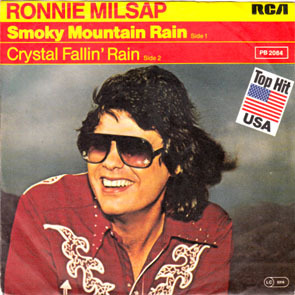
"Smoky Mountain Rain" is a song written by Kye Fleming and Dennis Morgan, and recorded by American country music singer Ronnie Milsap. It was released in September 1980 as the first and only single from his Greatest Hits compilation album. The single became one of his best-known songs.

"Six Days on the Road" is an American song written by Earl Green and Muscle Shoals Sound Studio songwriter Carl Montgomery, made famous by country music singer Dave Dudley. The song was initially recorded by Paul Davis and released in 1961 on the Bulletin label. In 1963, the song became a major hit when released by Dudley, peaking at #2 on the Billboard Hot Country Songs chart and cracking the Top 40 (#32) on the Hot 100, leading to it being hailed as the definitive celebration of the American truck driver.
"Detroit City" is a song written by Danny Dill and Mel Tillis, made famous by Billy Grammer, country music singer Bobby Bare and Tom Jones. Bare's version was released in 1963. The song — sometimes known as "I Wanna Go Home" — was Bare's first Top 10 hit on the Billboard Hot Country Singles chart that summer, and became a country music standard.

Mama Tried is the seventh studio album by American country music singer and songwriter Merle Haggard and The Strangers, released on Capitol Records in 1968. It reached number 4 on Billboard's country albums chart. The title song was one of Haggard's biggest hit singles and won the Grammy Hall of Fame Award in 1999.
"I Don't Call Him Daddy" is a song written by American songwriter Reed Nielsen. It was initially recorded by Kenny Rogers on his 1987 album I Prefer the Moonlight, and was released in October 1993 by Doug Supernaw as the third single from his debut album Red and Rio Grande. Supernaw's version was his only number-one single on the Billboard Hot Country Songs charts, peaking there in December 1993.

The Fine Print is a compilation album by American rock band Drive-By Truckers. Released in 2009, it consists unreleased material mostly recorded throughout the making of their albums Decoration Day and The Dirty South; a highly prolific period for the band. It features album artwork and a sample of concert posters from 2009 by Wes Freed, and is produced by David Barbe.

"Daddy Frank (The Guitar Man)" is a song written and recorded by American country music artist Merle Haggard and The Strangers. It was released in September 1971 as the first single from the album Let Me Tell You About a Song. The song was Haggard and the Strangers tenth No. 1 on the Billboard Hot Country Singles. The song topped the chart for two weeks around Thanksgiving 1971, and spent 13 weeks in the chart's Top 40.
